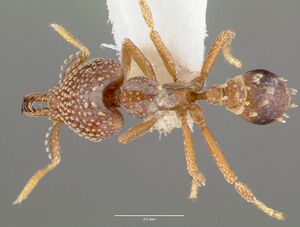Strumigenys ultromalyx
| Strumigenys ultromalyx | |
|---|---|

| |
| Scientific classification | |
| Kingdom: | Animalia |
| Phylum: | Arthropoda |
| Class: | Insecta |
| Order: | Hymenoptera |
| Family: | Formicidae |
| Subfamily: | Myrmicinae |
| Tribe: | Attini |
| Genus: | Strumigenys |
| Species: | S. ultromalyx |
| Binomial name | |
| Strumigenys ultromalyx Bolton, 2000 | |
Known from litter-samples from wet forest habitats.
Identification
A member of the arnoldi complex in the Strumigenys arnoldi-group.
Keys including this Species
Distribution
Latitudinal Distribution Pattern
Latitudinal Range: 2.06889° to -2.234166667°.
| North Temperate |
North Subtropical |
Tropical | South Subtropical |
South Temperate |
- Source: AntMaps
Distribution based on Regional Taxon Lists
Afrotropical Region: Cameroun, Gabon (type locality), Uganda.
Distribution based on AntMaps
Distribution based on AntWeb specimens
Check data from AntWeb
Countries Occupied
| Number of countries occupied by this species based on AntWiki Regional Taxon Lists. In general, fewer countries occupied indicates a narrower range, while more countries indicates a more widespread species. |

|
Estimated Abundance
| Relative abundance based on number of AntMaps records per species (this species within the purple bar). Fewer records (to the left) indicates a less abundant/encountered species while more records (to the right) indicates more abundant/encountered species. |

|
Biology
Castes
Worker
Images from AntWeb
   
| |
| Paratype of Strumigenys ultromalyx. Worker. Specimen code casent0005658. Photographer April Nobile, uploaded by California Academy of Sciences. | Owned by CAS, San Francisco, CA, USA. |
   
| |
| Paratype of Strumigenys ultromalyx. Worker. Specimen code casent0005659. Photographer April Nobile, uploaded by California Academy of Sciences. | Owned by CAS, San Francisco, CA, USA. |
Nomenclature
The following information is derived from Barry Bolton's Online Catalogue of the Ants of the World.
- ultromalyx. Strumigenys ultromalyx Bolton, 2000: 598 (w.) GABON.
Unless otherwise noted the text for the remainder of this section is reported from the publication that includes the original description.
Description
Worker
Holotype. TL 2.4, HL 0.69, HW 0.60, CI 87, ML 0.26, MI 38, SL 0.34, SI 57, PW 0.32, AL 0.64. Characters of arnoldi-complex. Mandible short and stout, of approximately constant width from base to distal preapical tooth and through this length the outer margin about straight. In full-face view the inner ventral margin of the mandible, in the distal half of the mandible length, plainly visible, distinctly projecting farther mesially than the inner dorsal margin and crossed by the proximal preapical tooth. Proximal preapical tooth located distal of the mandibular midlength, stoutly conical and slightly recurved, much longer and stouter than the distal preapical tooth. Scape conspicuously flattened and distinctly expanded, its leading edge markedly convex. Cephalic dorsum with a transverse row of 4 remiform hairs close to the occipital margin, these hairs only slightly larger and slightly more elevated than the broad ground-pilosity; without standing hairs anterior to this row. Pronotal humeral hair absent; side of pronotum unsculptured. Pronotal dorsum longitudinally rugulose. Disc of postpetiole apparently unsculptured (all specimens with dense waxy bloom on disc). Hairs on first gastral tergite coarse and very stoutly remiform, some appearing almost clavate in dorsal view.
Paratypes. TL 2.2-2.4, HL 0.62-0.69, HW 0.54-0.61, CI 85-90, ML 0.25-0.26, MI 37-40, SL 0.30-0.34, SI 54-59, PW 0.28-0.32, AL 0.58-0.64 (10 measured).
Type Material
Holotype worker, Gabon: Provo Woleu-Ntem, 31.3 km. 108° ESE Minvoul, 2°04.8'N, 12°24.4'E, 600 m., 11.ii.1998, #1648(8) (B. L. Fisher) (The Natural History Museum).
Paratypes. 23 workers with same data as holotype but samples #1648 (5, 10, 12, 13, 14, 29, 33, and 34) (BMNH, South African Museum, Museum of Comparative Zoology, Los Angeles County Museum of Natural History, coll. Fisher).
References
- Bolton, B. 2000. The ant tribe Dacetini. Memoirs of the American Entomological Institute. 65:1-1028. (page 598, worker described)
References based on Global Ant Biodiversity Informatics
- Bolton, B. 2000. The Ant Tribe Dacetini. Memoirs of the American Entomological Institute 65
- Fisher B. L. 2004. Diversity patterns of ants (Hymenoptera: Formicidae) along an elevational gradient on Monts Doudou in southwestern Gabon. Memoirs of the California Academy of Sciences 28: 269-286.

